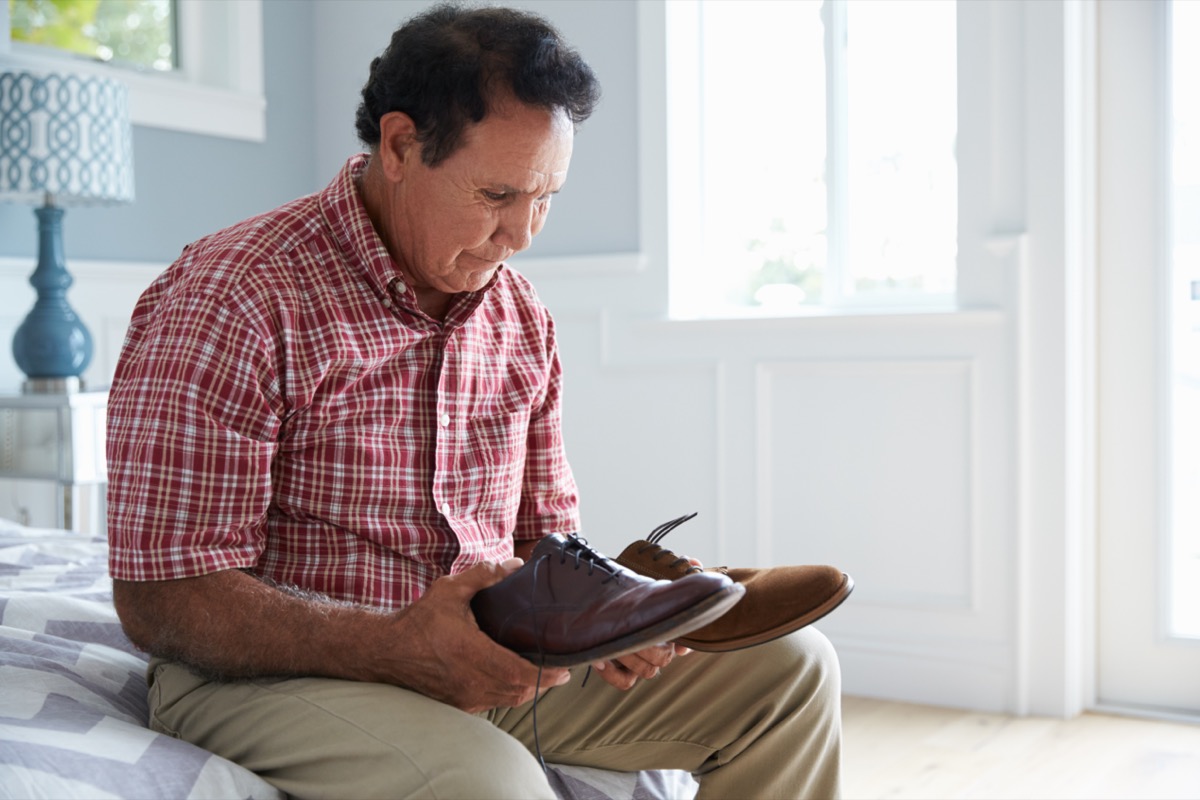The memories of places we've been, people we've met and adventures along the way help shape who we are. The stories we share of our journey in life with family and friends establish and reinforce connections, touch and inspire others and create long-lasting memories. But when memory loss happens, often our sense of self is lost.
It's common to be forgetful or lose some memory with age and Thomas Gut, DO, Associate Chair of Medicine at Staten Island University Hospital explains, "Our brains are in a constant cycle of repair using various proteins. As we age, these proteins that help keep the brain healthy wear out and replacement proteins aren't as effective as when we were younger." But not everyone will experience memory loss with aging.
Dr. Jacob Hascalovici MD, PhD Clearing Chief Medical Officer tells us, "Actually, not everyone actually does become more forgetful with age. It can happen, in other words, but isn't necessarily inevitable. When forgetfulness does occur, it can be due to "normal" causes, like hormonal shifts, impaired blood flow to the brain, or deterioration of the hippocampus. It could also be due to abnormal conditions like mild cognitive impairment, dementia, or Alzheimers. Stress and fatigue can also influence memory."
But there's good news. Memory can be improved and Eat This, Not That! Health spoke with experts who share what to know about memory loss and tricks on staying mentally sharp. Read on—and to ensure your health and the health of others, don't miss these Sure Signs You've Already Had COVID.
Tomi Mitchell, a Board-Certified Family Physician with Holistic Wellness Strategies says, "As we age, it's normal to experience changes in our physical and mental abilities. It takes longer to learn new things, our memory isn't as sharp as it used to be, and we may have trouble with physical activities that once came easily to us. These changes are a normal part of aging, and there's no need to worry about them unless they interfere with our daily lives. While some age-related changes are unavoidable, there are things we can do to help keep our brains and bodies healthy as we age. Regular exercise, eating a healthy diet, and staying socially active can help us stay sharp and physically fit as we age. So even though aging is a natural process, there's a lot we can do to help make the journey healthy and enjoyable.
However, some older adults experience more significant memory problems that can make it challenging to live independently. So why does this happen? One theory is that our brains slow down as we age, making it harder to process and store information. Another possibility is that we have more trouble focusing our attention as we get older, which makes it harder to encode new memories. Additionally, age-related changes in the brain can lead to the formation of plaques and tangles that interfere with neurochemical signaling. Whatever the cause, memory loss is a standard part of aging and can be a source of great frustration and anxiety for older adults."

Dr. Gut tells us, "Memory loss such as forgetting where you left your keys or remembering the name of a person you just met is a normal process that can get worse as we age. However, there are other types of memory less that are more concerning for dementia." Dr. Hascalovici says, "People should know that they can practice memory skills, just as they can do stretches and yoga to retain a sense of balance. The brain keeps making new cells and connections, and excels at being flexible and adaptable. What matters is to keep challenging it and expecting it to perform. Memory games, language learning, writing, and hobbies are all ways to keep an aging brain active, which could help ward off memory loss."
According to Dr. Mitchell, "Memory loss refers to unusual forgetfulness. It can be mild, where you may not be able to remember new events or recall one or more memories of the past. Or, it can be severe, where you cannot remember any past memories. The memory loss may be for a short time and then resolve (transient). Or, it may not go away, and, depending on the cause, it can worsen over time. There are many causes of memory loss, including transient causes such as stress or lack of sleep. However, there are also some serious causes, such as Alzheimer's disease or other forms of dementia. If you are concerned about your memory loss, seeing a doctor to diagnose and treat the cause is essential."

According to Dr. Gut, "Some signs that memory loss may be more than just typical forgetfulness include forgetting things that affect normal daily activities. Things like confusion about where you are or not being able to keep track of time are clues that memory changes have occurred that are beyond the typical aging process. Being unable to keep track of your own finances or personal hygiene can be a sign that memory function has declined to a point where safety can be a concern. Mood changes and withdrawal from daily social or work activities can also point to abnormal brain changes. All these signs can potentially be signs of various types of dementia."
Dr. Hascalovici tells us, "Memory loss often shows up as more "blank spaces" in your mind when you're trying to remember a specific word, recall recent world events, or remind yourself of what you're trying to do. Often, the difference between aging and a brain disorder like dementia are differences of magnitude. A forgotten word or name could belong to normal aging, while struggling to complete a conversation or get through a normal task like making coffee could signal something more concerning. "

Dr. Gut explains, "Controlling chronic medical problems is one of the best ways to prevent progression of some types of dementia. Controlling blood pressure and sugars can prevent any further decline." The Mayo Clinic says, "Treat high blood pressure, high cholesterol and diabetes. Lose weight if you're overweight.
High blood pressure might lead to a higher risk of some types of dementia. More research is needed to determine whether treating high blood pressure may reduce the risk of dementia."
Alzheimers.gov states, "High blood pressure, or hypertension, has harmful effects on the heart, blood vessels, and brain, and increases the risk of stroke and vascular dementia. Treating high blood pressure with medication and healthy lifestyle changes, such as exercising and quitting smoking, may help reduce the risk of dementia." In addition, the site says, "Higher than normal levels of blood sugar, or glucose, can lead to diabetes and may increase the risk of heart disease, stroke, cognitive impairment, and dementia. Making healthy food choices, getting regular exercise, stopping smoking, and checking glucose levels can help manage blood sugar."

Dr. Mitchell says, "We all know how important it is to exercise our bodies to stay healthy, but did you know that exercise is just as crucial for maintaining a healthy brain? Regular exercise can help to improve memory and cognitive function. One theory is that exercise helps to increase blood flow to the brain, which provides essential nutrients and oxygen. Exercise also promotes the development of new brain cells and can help protect existing brain cells from damage. So, if you're looking for a way to start improving your memory, there's no need to look any further than your local gym – regular exercise is one of the best things you can do for your brain!
As you get older, you may notice that it becomes more challenging to stay active. You may not have the same energy levels as you did when you were younger, and you may find yourself making excuses to skip exercise. However, there are many benefits to staying active as you age, including improved brain function. Exercise helps to increase blood flow to the brain, which can help to improve memory and cognitive function. In addition, exercise helps to reduce the risk of developing dementia and another age-related cognitive decline. Even if you are not looking to improve your memory, adding some exercise to your daily routine can help to improve your overall health and well-being. And, who knows, you may find that you enjoy it!"

According to Dr. Mitchell, "Making mental connections is a strategy that can help improve our memory. When we make a mental connection, we link new information to something we already know. Making mental connections is a strategy that can help us remember new information. When we make a mental connection, we link the new information to something we already know. For example, if you are trying to remember the name of a new person you met at a party, you might link their name to someone else you know who has the same name. Or, if you are trying to remember the meaning of a new vocabulary word, you might link the word to a similar word you already know. Making mental connections is a valuable strategy because it allows us to use our prior knowledge to help us remember new information.
How does making mental connections help improve our memory? There are several ways. First, it helps us remember new information more quickly because we have something to connect it to. Second, it helps us encode new information more deeply because we process it in multiple ways (by linking it to other information and by itself). Third, it helps us retrieve information more quickly because we have multiple retrieval cues (the original piece of information and the thing it is connected to). All of these factors combine to make it more likely that we will remember something if we make a mental connection to it.
When should adults start making mental connections? There is no one answer to this question; it depends on the individual and the situation. However, some experts suggest that adults should start making mental connections when they encounter new information they want to remember. This way, they can take advantage of the benefits of this memory strategy from the very beginning. Others suggest that adults should wait until they have had some time to process the new information before making any connections to it; this allows them to develop their understanding of the material before connecting it to other things they know. Ultimately, there is no right or wrong answer; adults can experiment with different approaches and see what works best for them in different situations.
One way to help improve our memory is by associating new information with existing knowledge. For example, if you're trying to remember the name of a new person you've just met, try to think of someone you know with the same name. This will help create a mental connection that you can use to recall the new name later on."
The post Easy Ways to Improve Your Memory in Seconds by Making Mental Connections appeared first on Eat This Not That.
----------------
By: Heather Newgen
Title: Easy Ways to Improve Your Memory in Seconds by Making Mental Connections
Sourced From: www.eatthis.com/easy-ways-to-improve-your-memory-in-seconds-by-making-mental-connections/
Published Date: Thu, 24 Nov 2022 12:01:59 +0000
Read More
Did you miss our previous article...
https://naturesmart.us/fitness/11-restaurant-chains-open-on-thanksgiving-day
 HealthWellnessFitnessBeautyVideosPrivacy PolicyTerms And Conditions
HealthWellnessFitnessBeautyVideosPrivacy PolicyTerms And Conditions
